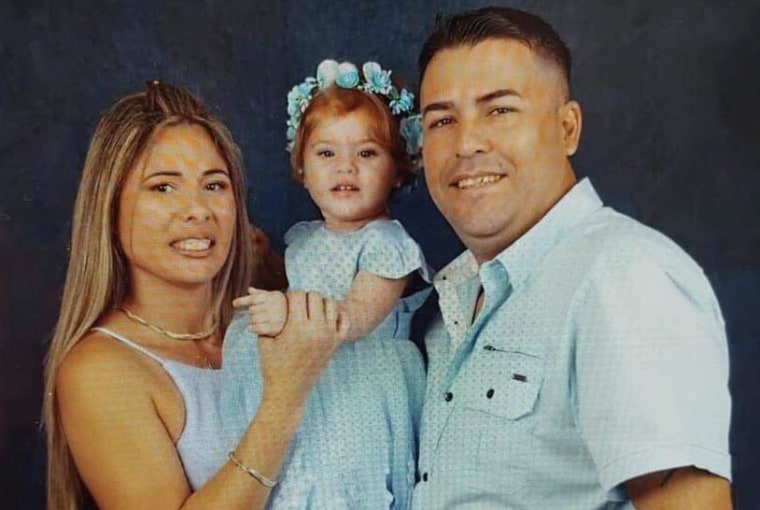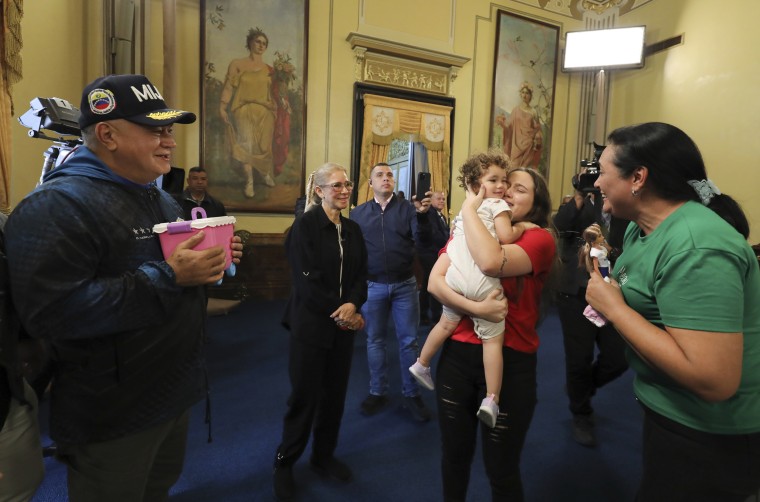
Sen. Jon Ossoff, D-Ga., said he’s demanding answers about reports that the Trump administration is prioritizing separating families instead of focusing on threats to public safety when it comes to immigration enforcement.
In a letter to Homeland Security Secretary Kristi Noem on Thursday, Ossoff cited the cases of two immigrant mothers who were recently deported and separated from their children.
The first woman, Heidy Sánchez, was detained during a routine immigration check-in appointment in April and deported to Cuba without her U.S.-citizen baby daughter, who has a history of seizures and was still being breastfed. Sánchez’s attorney, Claudia Cañizares, told NBC Miami that the woman “had no criminal records.”

Immigration authorities didn’t comment on the case. The Trump administration has said in previous comments that deported parents have been given the choice to take their children or not.
The second woman, Yorely Bernal, was deported to Venezuela in April without her 2-year-old despite having authorized her removal alongside her daughter’s. The toddler was instead taken into U.S. custody and bounced around three foster families before being reunited with her mother in Venezuela.
The Trump administration justified the separation at the time by alleging the girl’s parents were affiliated with the Tren de Aragua gang, though it didn’t give specific evidence.

“I write with grave concerns about reports of the Department of Homeland Security (DHS) separating families,” reads the letter, which was first obtained by NBC News. “I urge you to reprioritize threats to public safety in immigration enforcement and use your discretion to grant humanitarian parole to keep infants and young children in their parents’ care.”
Both cases illustrate the stepped-up pace of deportations of immigrants who don’t have criminal charges or convictions, even though President Donald Trump said during his election campaign that the focus would be on deporting violent criminals.
In a case NBC News first reported in March, a 17-year-old U.S. citizen in a mixed immigration status family was left behind in the United States when his siblings, one of whom is an 11-year-old U.S. citizen girl recovering from a rare brain tumor, were removed to Mexico when immigration authorities deported their undocumented parents.

Two mothers deported to Honduras in April were removed with their U.S. citizen children, including a 4-year-old boy with Stage 4 cancer. The children’s fathers were residing in the United States and were unable to make decisions about their children before they were flown to Honduras, according to Gracie Willis, their attorney.
“DHS seems to prioritize those in closest reach, including individuals appearing at immigration check-ins, on monitoring programs, or in the wrong place at the wrong time, regardless of their criminal history and sometimes even regardless of their citizenship status,” Ossoff wrote. “DHS has deployed significant enforcement resources to cruelly separate young children from primary caregivers who pose no threat to public safety.”
Ossoff cited the American Academy of Pediatrics, which has said family separation “can cause irreparable harm, disrupting a child’s brain architecture and affecting his or her short- and long-term health.”
He also asked Noem’s office to provide information by June 6 about the impact Trump’s immigration crackdown is having on children who are deported, left behind in the United States or sent abroad with their deported parents.
In April, the latest month for which data is available, federal immigration authorities deported over 17,200 people, an increase of about 29% compared with April 2024, when over 13,300 were deported.
There are 48,674 people in immigration detention last week, according to NBC News’ tracker. Only a third have criminal convictions, and about a quarter have pending charges that may or may not be sustained in court.
Deporting more than 17,200 people in a single month still doesn’t put Trump on track to make good on his Inauguration Day promise to deport “millions and millions.” It is still less than half the pace it would take to reach the record number of 430,000 deportations in a single year, set during the Obama administration in 2013.
 Latest World Breaking News Online News Portal
Latest World Breaking News Online News Portal







